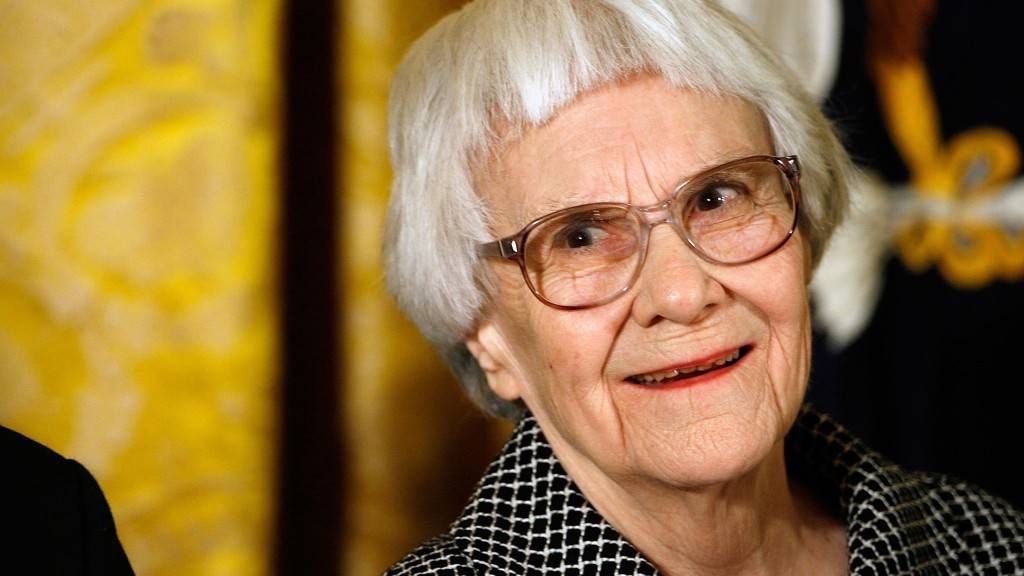
Bye, Boo: My Love to Harper Lee
She is the heart and whole of my complicated Southern vocabulary–a means of talking about roots in a gracious but self-critical way, of celebrating regional beauties while reserving the exclusive right to tear local foibles down. You don’t have to love everything about your home, but you can still move through home like Scout–maintaining what’s best, celebrating what’s perennial, and repudiating relics from smaller ages.
Here’s my short list of Southern loves, derived from two decades in Georgia towns: the first wisteria days of spring. The ring of “y’all.” Fried green tomatoes and Coca-Cola. Savannah slow walks through the heat. Harper Lee.
When did her lines first transform my practiced incongruence to red soil and blessed-hearts into something more like being home? I held a deckle-edged copy of To Kill a Mockingbird open on my lap, absorbing her words on the quad, in the last light of the afternoon: talcum powdered ladies moving molasses-slow through Alabama heat, wanting little and reveling in their history. Here were the first pangs of Southern familiarity.
And weeping over Tom Robinson: Atticus’s pained introduction of racism, in its unjust and persistent magnitude, to his children helped me to build a reluctant bridge to a location that I’d resisted fully inhabiting in great part because so many people maintain racism as if it’s a matter of Southern pride. But not Atticus, I thought; never a Finch.
I can not forget that Georgia school children, with the pomp of privilege, taught me the n*word on the bus–threw it casually at schoolmates, that it hung in the air without even tacit admonitions from adults–or that they still had scandalized responses to interracial relationships, that this was still the atmosphere that took Emmett Till, in Tom Robinson fashion, and forgot to apologize.
But then there was Atticus, reviling those habits, hating their bloodlust, telling his own children to never sink so low. Bigotry is small-minded, he tells Scout, a wicked, base, and curling inclination. One that fine Maycomb families can rise above. I believed.
I owe Harper Lee so much–both by way of Southern optimism, and for the degrees by which her meted-out truths helped to wake me up. It’s not just Mockingbird that shines a light; Go Set a Watchman does it, too. Her books are not just about celebrating that people can do better; they are an acknowledgement that so many people fail to. Basic decency is not so basic, or at least it is not widely discernible in our cultural ways. Have we evolved past many people in Maycomb, really?
Watchman reminds us: the perfect white Southerner, who rejects every bit of the racism that the region beats into its children, the Atticus of your childhood: that figure is a myth. Ensconcing Atticus as a mission-accomplished, raising him up to declare “not all Southerners,” moors us. Set the idea of Atticus aside. We are our own watchpeople. We should be, should always be trying, to work to protect and defend Tom Robinson, in all his modern incarnations, ourselves.
“Atticus….how could they do it?”
“I don’t know, but they did it. They’ve done it before and they did it tonight and they’ll do it again, and when they do it—seems only the children weep.”
A meme with these words of Harper’s circulated after Trayvon’s killer was acquitted; they rose again when Tamir Rice was denied his justice. We still reach to her words in mourning–still know that they embody the naivete of not recognizing how we got here, when here does its vicious worst.
There’s little personal ownership of that worst in Mockingbird, and only hints of its beginnings in Watchman, though it is, at last, a reminder that mourning is not enough. She gets us someway there.
____
Harper Lee spent the last few years of her life in a horrifying kind of seclusion–deaf, nearly blind, and alone. Monroeville stayed wrapped around her, practiced at protecting her, having kept the outside in its place for decades.There are hints that she was taken advantage of, that money and manuscripts left her hands without her full understanding or consent. She was an American literary giant; no one could wish on her a continuation of that state.
You can’t help but remember Boo Radley–so broken by his time out in the world that he moved, or was shoved, back inside, kept from company in daylight hours, reduced to an enigma, until he finally disappeared. Harper’s readers spent years speculating like the Finch children, craving a glimpse of her, inventing notions of her in her absence.
We mostly just have mythologies when it comes to Harper Lee. There won’t ever be a moment of recognition on an Alabama porch. We won’t have another opportunity to thank her for the new conversational opportunities she introduced into our lives, for the Ewells she tried to end, or for the baubles she left for us to find. We have our love, our sadness, and her end.
With love, and wishing her peace: bye, Boo.








